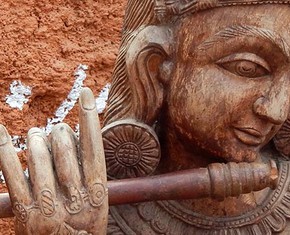The views expressed in our content reflect individual perspectives and do not represent the authoritative views of the Baha'i Faith.
The curious soul who sent a series of questions to my Local Spiritual Assembly, had a number of specific questions, but later asked if I would add any facts about the Faith that I found interesting.
Who could resist such an open invitation? Not me. I started with an historical note:
Baha’u’llah’s revelation was preceded by nineteen years by the revelation of another Persian prophet who took the title of the Bab, meaning “the Gate.” The Bab viewed his teachings as a gate between him and the prophet that would appear soon after him. Because of the profound effect the teachings of these two had on Persia (which was rigidly dogmatic in its practice of Islam) the Bab was imprisoned, then executed for heresy. Thousands of his followers faced the same fate. For the same reasons, Baha’u’llah spent most of his adult life in exile and imprisonment, lastly in the prison-city of Akka in Palestine.
All of Baha’u’llah’s works described earlier and quoted from — which include the design of the Baha’i administrative order and letters to world rulers such as Napoleon III, Pope Pius IX, and Queen Victoria — were revealed under constant deprivation, torture, and threat of death. Baha’u’llah’s successor Abdu’l-Baha, who traveled to the West to teach his father’s Faith, entered the custody of the Persian and Ottoman empires as a child and left it as an elderly man. This makes his copious writings on social issues, science, governance, and religion even more remarkable than it would be for someone who had spent years in formal study.
RELATED: What Makes the Baha’i Faith Different from Other Religions?
Personally, I consider this one of the verifiable miracles of any revealed religion — that their authors were not people who could have been expected to have any of the knowledge or the insight they gave to the world.
In terms of social action, Baha’is abstain from partisan politics and do not affiliate ourselves with political parties. However, we are encouraged to vote and actively participate in social discourse and non-partisan causes that benefit humanity. Baha’u’llah and Abdu’l-Baha both wrote of the way that partisanship erodes civility and destroys unity.
Baha’is don’t have churches in the traditional sense. Some larger communities, like mine, have Baha’i Centers, but most worship in Baha’i homes. Baha’is do, however, have Baha’i Houses of Worship on each continent. The North American House of Worship is on the shores of Lake Michigan in Wilmette, Illinois. Its sister temples – in Germany, India, Chile, Panama, Australia, Uganda and Western Samoa – have more recently been joined by regional and local Baha’i Houses of Worship raised in Cambodia, Columbia, New Guinea, Kenya, and Vanuatu. All Baha’i temples have nine sides, symbolizing their purpose as houses of worship for all humanity.
RELATED: The Baha’i Faith: 15 Completely New and Distinctive Principles
A scientific note: I mentioned that one of the principles of the Faith was the harmony of science and religion. The Baha’i Faith’s scriptural references to science are remarkable in an age when science seems to be under attack by some religious schools of thought. In the mid-to-late 1800s Baha’u’llah wrote:
The learned men, that have fixed at several thousand years the life of this earth, have failed, throughout the long period of their observation, to consider either the number or the age of the other planets. Consider, moreover, the manifold divergencies that have resulted from the theories propounded by these men. Know thou that every fixed star hath its own planets, and every planet its own creatures, whose number no man can compute.
Abdu’l-Baha followed that up with statements like these:
The virtues of humanity are many but science is the most noble of them all. The distinction which man enjoys above and beyond the station of the animal is due to this paramount virtue. It is a bestowal of God; it is not material, it is divine. Science is an effulgence of the Sun of Reality, the power of investigating and discovering the verities of the universe, the means by which man finds a pathway to God.
Scientific knowledge is the highest attainment upon the human plane, for science is the discoverer of realities. It is of two kinds: material and spiritual. Material science is the investigation of natural phenomena; divine science is the discovery and realization of spiritual verities. The world of humanity must acquire both. A bird has two wings; it cannot fly with one. Material and spiritual science are the two wings of human uplift and attainment. Both are necessary …
I feel I should mention, in closing, that I’m a science fiction writer. These statements helped me transform that pastime from daydream to vocation.
















Comments
Sign in or create an account
Continue with Googleor